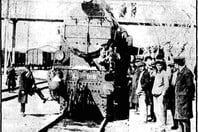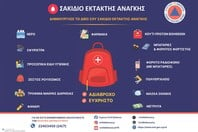1 ) Ποιηματακι των ΚΚΚ για τους ελληνεςWhen cotton grows on the fig tree
And alfalfa hangs on the rose
When the aliens run the United States
And the Jews grow a straight nose
When the Pope is praised by every one
In the land of Uncle Sam
And a Greek is elected President
THEN-the Ku Klux won't be worth a damn-- Poem passed out at election polls by the Klan during the 1920's illustrating that, as with anti-Semitism, anti-Hellenism is not a new phenomenon.Πηγη : απο την ιστοσελιδα του καταπληκτικου ΑHMP του συνταξιουχου δικαστη απο ΝΥ, P. Spyropopoulos http://www.ahmp.org/bias.html2 ) Για το ξεχασμενο απο μας τους ελληνες, ευρωπαικο μεσαιωνικο σκλαβοπαζαρο των Ιταλων ( Ενετων, Τζενοβεζων, νοτιο-ιταλων )Demand from the Islamic world dominated the slave trade in medieval Europe.[11][12][13][14] For most of that time, however, sale of Christian slaves to non-Christians was banned.[citation needed] In the pactum Lotharii of 840 between Venice and the Carolingian Empire, Venice promised not to buy Christian slaves in the Empire, and not to sell Christian slaves to Muslims.[11][15][16] The Church prohibited the export of Christian slaves to non-Christian lands, for example in the Council of Koblenz in 922, the Council of London in 1102, and the Council of Armagh in 1171.[17]As a result, most Christian slave merchants focused on moving slaves from non-Christian areas to Muslim Spain, North Africa, and the Middle East, and most non-Christian merchants, although not bound by the Church's rules, focused on Muslim markets as well.[11][12][13][14] Arabic silver dirhams, presumably exchanged for slaves, are plentiful in eastern Europe and Southern Sweden, indicating trade routes from Slavic to Muslim territory.[18]Italian merchants[edit]By the reign of Pope Zachary (741–752), Venice had established a thriving slave trade, buying in Italy, amongst other places, and selling to the Moors in Northern Africa (Zacharias himself reportedly forbade such traffic out of Rome).[19][20][21] When the sale of Christians to Muslims was banned (pactum Lotharii[15]), the Venetians began to sell Slavs and other Eastern European non-Christian slaves in greater numbers. Caravans of slaves traveled from Eastern Europe, through Alpine passes in Austria, to reach Venice. A record of tolls paid in Raffelstetten (903–906), near St. Florian on the Danube, describes such merchants. Some are Slavic themselves, from Bohemia and the Kievan Rus'. They had come from Kiev through Przemyśl, Kraków, Prague, and Bohemia. The same record values female slaves at a tremissa (about 1.5 grams of gold or roughly 1⁄3 of a dinar) and male slaves, who were more numerous, at a saiga (which is much less).[11][22] Eunuchs were especially valuable, and "castration houses" arose in Venice, as well as other prominent slave markets, to meet this demand.[18][23]Venice was far from the only slave trading hub in Italy. Southern Italy boasted slaves from distant regions, including Greece, Bulgaria, Armenia, and Slavic regions. During the 9th and 10th centuries, Amalfi was a major exporter of slaves to North Africa.[11] Genoa, along with Venice, dominated the trade in the Eastern Mediterranean beginning in the 12th century, and in the Black Sea beginning in the 13th century. They sold both Baltic and Slavic slaves, as well as Armenians, Circassians, Georgians, Turks and other ethnic groups of the Black Sea and Caucasus, to the Muslim nations of the Middle East.[24] Genoa primarily managed the slave trade from Crimea to Mamluk Egypt, until the 13th century, when increasing Venetian control over the Eastern Mediterranean allowed Venice to dominate that market.[25] Between 1414 and 1423 alone, at least 10,000 slaves were sold in Venice.[26]Πηγη : Wiki3 ) Ο ρολος του Οτις στο θρυλικο Hound Dog. https://www.youtube.com/watch?v=frsBq9MCNVgBig Mama Thornton's version (1952)[edit]Thornton's recording of "Hound Dog" is credited with "helping to spur the evolution of black R&B into rock music".[8] Brandeis University professor Stephen J. Whitefield, in his 2001 book In Search of American Jewish Culture, regards "Hound Dog" as significant, as it "marked the success of race-mixing in music a year before the desegregation of public schools was mandated"[18] in Brown v. Board of Education. Leiber regarded the original recording by the 350-pound "blues belter" Big Mama Thornton as his favorite version,[16][19] while Stoller said, "If I had to name my favorite recordings, I'd say they are Big Mama Thornton's 'Hound Dog' and Peggy Lee's 'Is That All There Is?'"[20]Recording[edit]Thornton recorded "Hound Dog" at Radio Recorders Annex[21] in Los Angeles on August 13, 1952, the day after its composition. It subsequently became her biggest hit. According to Hound Dog: The Leiber and Stoller Autobiography, Thornton's "Hound Dog" was the first record that Leiber and Stoller produced themselves, taking over from bandleader Johnny Otis. Said Stoller:We were worried because the drummer wasn't getting the feel that Johnny had created in rehearsal. "Johnny," Jerry said, "can't you play drums on the record? No one can nail that groove like you." "Who's gonna run the session?" he asked. Silence. "You two?" he asked. "The kids are gonna run a recording session?" "Sure," I said. "The kids wrote it. Let the kids do it." Johnny smiled and said, 'Why not?'"[21]Otis played drums on the recording,[22] replacing Ledard "Kansas City" Bell. As Otis was still signed exclusively to Federal Records, a subsidiary of Syd Nathan's King Records as "Kansas City Bill"[23] or perhaps with Mercury Records at this time, [24][25] Otis used the pseudonym "Kansas City Bill" (after his drummer "Kansas City" Bell) on this record. Therefore, Otis, Louisiana blues guitarist Pete "Guitar" Lewis, and Puerto Rican bass player Mario Delagarde[26] (some sources say erroneously it was Albert Winston) are listed as "Kansas City Bill & Orchestra" on the Peacock record labels.[27][28] In an interview included on the album Leavin' Chicago, Thornton credits Lewis for establishing the feel of her recording.Σιγουρα ενας ηλικιωμενος στο τρενο, γνωστοι και συγγενεις του κ Πολιτακη στη ΝΥ και η αρχιεπισκοπη, δε μπορουν να σκιαγραφησουν την ιστορια της ελληνοαμερικης των τελευταιων 40 χρονων. Κι αυτο γιατι το ελλειμα κοινοτικης οργανωσης του ανω των 1 εκατ ψυχων που αποτελουν την διασπορα μας στην Αμερικη, και η παθητικοτητα στα κοινα των ελληνοαμερικανων πανεπιστημιακων οπως ο Αναγνωστου και οι συναδελφοι του, στα ζητηματα που μας καινε ( εκπαιδευτικη υποδομη και εμπλοκη στα ΞΕΝΑ μηντια ( οχι τα ελληνικα ‘η τα ελληνοαμερικανικα αφου αυτο ειναι πανευκολο ) αφηνει το “αρχιεπισκοπικο μοντελο” να φανταζει ως εκπροσωπος της. Δεν ειναι ομως. Η πλειοψηφια των ελληνοαμερικανων των τελευταιων δεκαετιων και ειδικα σημερα ειναι οσο σεκιουλαριστες, ρατσιστες ‘η μη, ειναι οι ελληνες στην Ελλαδα. Συνεπως ο Ελπιδοφορος δε μπορει να αντιπροσωπευει παρα μοναχα αυτους που ηταν ενηλικες το 1950 και τωρα εχουν πεθανει.Κατι λογικο που θα μπορουσε να ερευνηθει ειναι η ταξικη θεση του ελληνα μεταναστη σε συσχετισμο με την κοινωνικα υποβαθμισμενη θεση του αφροαμερικανου. Καπου συναντιουνται αυτα τα δυο σε αμερικανικες πολεις που υποδεχονταν ελληνες, πχ στο Ντιτρο'ι'τ, το Σικαγο, το Μα'ι'αμι. Δε μπορω να φανταστω οτι ο ελληνας μεταναστης, που σε πολλες περιπτωσεις εχει και εμπειριες και κουβαλα αναμνησεις με ανθρωπους αλλων χωρων της ανατολικης Μεσογειου ( Τουρκια, Αιγυπτο, κλπ ) εχει μεγαλυτερο προβλημα ρατσισμου απο εναν προτεσταντη σουηδο 'η εγγλεζο μεταναστη για παραδειγμα. Ζωντας τριαντα χρονια στην Αμερικη και μελετωντας συστηματικα την διασπορα μας εδω ( αλλα και στην Καραιβικη που εχω γεννηθει, μια περιοχη που εχει παιξει τεραστιο ρολο στην δια-της-βιας μεταναστευση των μαυρων στις ΗΠΑ ) ποτε μου δεν ενιωσα οτι υπαρχει ταση αμφιδρομου ρατσισμου μεταξυ ελληνων και αφροαμερικανων. Θα ηθελα επισης να επισημανω ενα σημειο που απειροελαχιστες φορες αναφερεται στα μηντια παροτι ειναι ιδιαιτερα σημαντικο στο ζητημα των αφροαμερικανων και την πολυπλοκοτητα του ρατσισμου που δεχονται. Αναφερομαι στον ρατσισμο αφρικανων μαυρων προς αφρο-αμερικανους που ειναι παρα πολυ ισχυρος. Δε συμπαθουν ο ενας τον αλλο και δεν εχουν προβλημα να στο πουνε. Κανεις δε μιλαει γι αυτο ομως.























